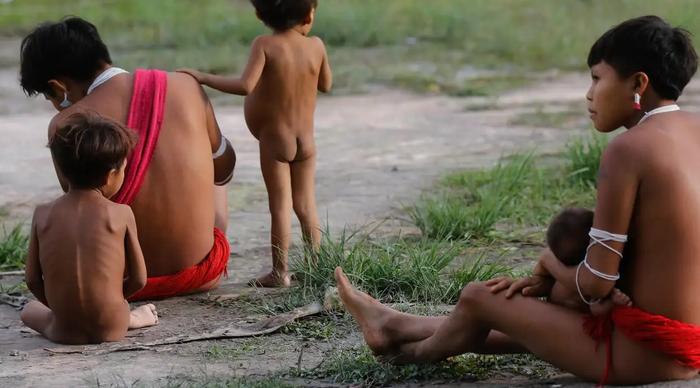A strong denunciation of poor health among Yanomami children has been published in the journal Nature Medicine by researchers at the State University of Campinas (UNICAMP) in Brazil. The article, signed by Thiago dos Reis Araujo, Ana Paula Davel and Everardo Magalhães Carneiro, reveals that the children of this ethnic group are currently facing the most severe nutritional deficit of any Indigenous community in the Americas, that some 570 Yanomami children have starved to death in the last four years, and that 52.2% of Yanomami children under the age of 5 are undernourished, compared with a global average of 29.1%.

Credit: Fernando Frazão/Agência Brasil
A strong denunciation of poor health among Yanomami children has been published in the journal Nature Medicine by researchers at the State University of Campinas (UNICAMP) in Brazil. The article, signed by Thiago dos Reis Araujo, Ana Paula Davel and Everardo Magalhães Carneiro, reveals that the children of this ethnic group are currently facing the most severe nutritional deficit of any Indigenous community in the Americas, that some 570 Yanomami children have starved to death in the last four years, and that 52.2% of Yanomami children under the age of 5 are undernourished, compared with a global average of 29.1%.
The Yanomami territory is the largest Indigenous reservation in Brazil. Illegal mining, forest fires and deforestation increased sharply in 2019, without any effective attempts to stop them by the administration of former president Jair Bolsonaro (2019-2022). All these problems led the federal government to declare a public health emergency there after President Lula took office.
“Action must be taken urgently to improve the nutritional status of the Yanomami, according to Brazil’s Minister for Indigenous Affairs, Sônia Guajajara. Malnutrition during infancy and early childhood can have lifelong effects on health and increase the risk of disease in adulthood. The risk persists even after nutritional rehabilitation,” Davel says.
As Magalhães Carneiro explains, “Researchers at the University of Southampton in the United Kingdom have proposed what they call the ‘thrifty phenotype’ hypothesis, according to which individuals exposed to poor nutrition during critical stages of their development, including the fetal stage in the mother’s womb, as well as breastfeeding and infancy, are likely to have several malformed or malfunctioning organs and to suffer from disease in adulthood.”
The hypothesis was corroborated by data from the “Dutch hunger winter” of 1944-45 when the Nazis cut off food supplies to part of the Netherlands in retaliation for the exiled Dutch government’s support for the Allies. Some 20,000 people died in the resulting famine, and 4.5 million suffered from long-term consequences. Babies born at the time or shortly afterward were stunted and underweight. When they grew up, they displayed a propensity to develop various diseases resulting from undernourishment and a higher-than-normal death rate.
“Undernourishment during infancy and early childhood causes many structural and functional alterations, making the future adult more likely to suffer from obesity, diabetes, cardiovascular disease, cognitive problems and personality disorders,” Magalhães Carneiro says. This information is very important in light of the fallacy that the effects of undernourishment will simply disappear as soon as a starving person is properly fed. “On the contrary, nutritional rehabilitation should be conducted with great care. The organism isn’t ready to metabolize large amounts of nutrients.”
To make matters worse, the damage done by chronic undernourishment can be transmitted to the next generation. Studies conducted in Manaus and Rio de Janeiro by Oswaldo Cruz Foundation (Fiocruz), the biological science research and development arm of the Ministry of Health, evidenced high prevalence of dwarfism among Yanomami children associated with decreasing maternal height.
According to the authors, strategic action is “urgently needed to anticipate and mitigate the long-term consequences” of undernourishment for the health of the Yanomami. They call on governments, universities, research institutions and funding agencies to join forces in this direction, stressing that “any nutritional intervention or strategy” must be planned, “culturally adapted”, and extended to areas and municipalities adjacent to the Yanomami communities.
They also underscore the importance of linking strategies to protect health and territory, implementing effective environmental management, controlling mining and other uses of natural resources, and designing socio-environmental offsets and policies to protect Indigenous territories.
All three authors are affiliated with the Obesity and Comorbidities Research Center (OCRC), a Research, Innovation and Dissemination Center (RIDC) funded by FAPESP and hosted by UNICAMP. Magalhães Carneiro is one of OCRC’s principal investigators and is also the PI for a Thematic Project funded by FAPESP.
About São Paulo Research Foundation (FAPESP)
The São Paulo Research Foundation (FAPESP) is a public institution with the mission of supporting scientific research in all fields of knowledge by awarding scholarships, fellowships and grants to investigators linked with higher education and research institutions in the State of São Paulo, Brazil. FAPESP is aware that the very best research can only be done by working with the best researchers internationally. Therefore, it has established partnerships with funding agencies, higher education, private companies, and research organizations in other countries known for the quality of their research and has been encouraging scientists funded by its grants to further develop their international collaboration. You can learn more about FAPESP at www.fapesp.br/en and visit FAPESP news agency at www.agencia.fapesp.br/en to keep updated with the latest scientific breakthroughs FAPESP helps achieve through its many programs, awards and research centers. You may also subscribe to FAPESP news agency at http://agencia.fapesp.br/subscribe.
Journal
Nature Medicine
Article Title
Life-long health consequences of undernutrition in the Yanomami indigenous population in Brazil
Article Publication Date
30-Apr-2024



